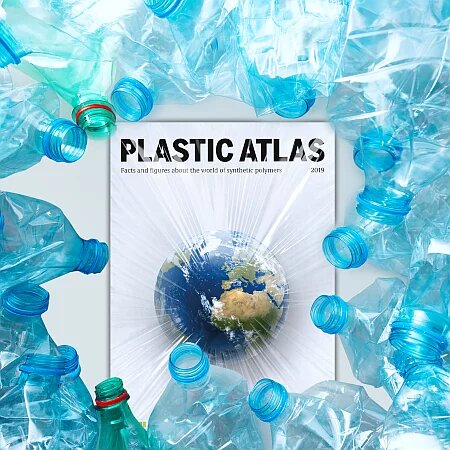The Plastic Atlas contains more than 49 detailed infographics covering a broad range of topics regarding the plastic pollution crisis looking along the entire value chain of plastic. The atlas highlights the scale of the crisis, and the global impacts of plastic production, consumption and disposal on other key global challenges such as human health and climate change. It also outlines the role of plastic for key industrial sectors such as agriculture and tourism and describes the corporate interests and drivers behind the plastic crisis.

A new Plastic Atlas by the Heinrich Boell Foundation and the Break Free From Plastic movement to highlight the scale of the plastic crisis, and the global impacts of plastic production, consumption and disposal has been launched.
The Plastic Atlas contains more than 49 detailed infographics covering a broad range of topics regarding the plastic pollution crisis looking along the entire value chain of plastic. The atlas highlights the scale of the crisis, and the global impacts of plastic production, consumption and disposal on other key global challenges such as human health and climate change. It also outlines the role of plastic for key industrial sectors such as agriculture and tourism and describes the corporate interests and drivers behind the plastic crisis. Finally, the Plastic Atlas presents an overview of key plastic-free regulations, zero waste solutions and a snapshot of the growing global movement working towards a future free from plastic pollution.
Speaking at the launch, the Heinrich Böll Foundation’s President, Barbara Unmüßig called for global action to address the crisis at source:
“A ban on single-use plastics makes sense but will not be sufficient to end one of the biggest environmental crises of the planet. Plastics began as a waste product of the petrochemical industry. Today, ExxonMobil, BASF, Eni, INEOS, and Dow are the biggest plastic producers worldwide with sales totaling 420 billion Euros per year,” Unmüßig said. “Instead of cutting down on this part of the business they have clear targets to increase plastic production over the coming years. The unlimited availability of cheap oil and gas as raw materials for plastic production prevents effective recycling strategies and blocks a real circular economy. Regional and global politics must hold the plastic industry accountable and define a clear and strict framework for the reduction of overall plastic production and consumption. However, circular-economy strategies are needed to make a lasting impact”, Unmüßig emphasized.
As much as the awareness of the negative consequences of plastic is growing, we are experiencing an unbroken boom in plastic production. 99 percent of the plastic is produced from fossil fuels; the climate-damaging emissions involved are enormous. And only nine percent of all plastic thrown away since 1950 has been recycled; instead, huge amounts of our plastic waste end up in dumps in Asian countries every day.
We have only just begun to understand the huge dimensions of this crisis. A change of course requires in-depth knowledge of the causes, interests, responsibilities and effects of the plastics crisis. The Plastics Atlas 2019 offers exactly that in 19 chapters.
Download the full Plastic Atlas now!